人教版(2019)选择性必修第二册Unit 2 Bridging Cultures Reading and Thinking 课件(共33张PPT)
文档属性
| 名称 | 人教版(2019)选择性必修第二册Unit 2 Bridging Cultures Reading and Thinking 课件(共33张PPT) | 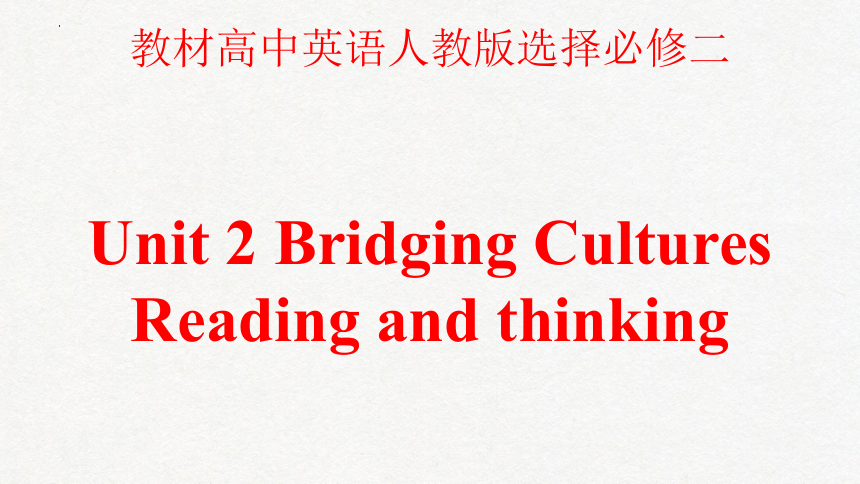 | |
| 格式 | pptx | ||
| 文件大小 | 5.2MB | ||
| 资源类型 | 教案 | ||
| 版本资源 | 人教版(2019) | ||
| 科目 | 英语 | ||
| 更新时间 | 2023-12-27 10:42:37 | ||
图片预览

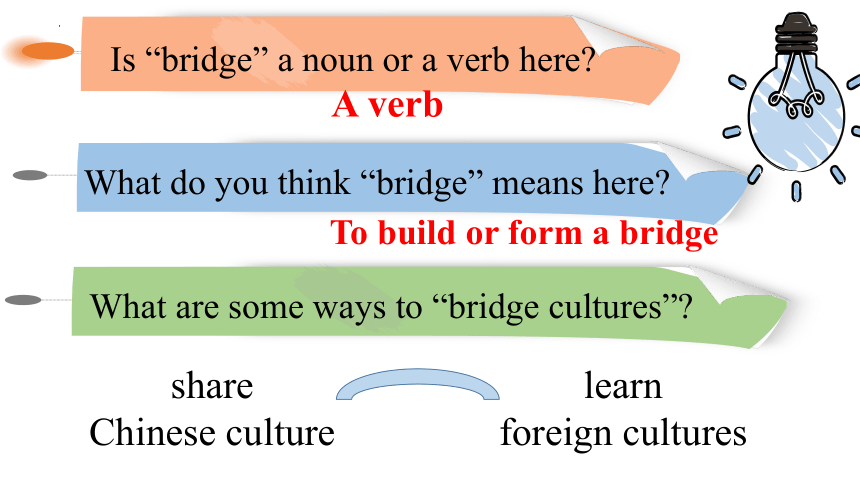
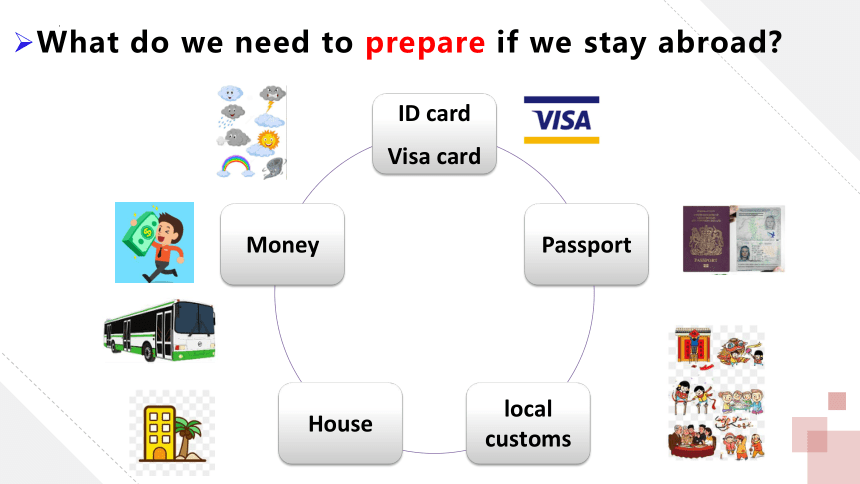
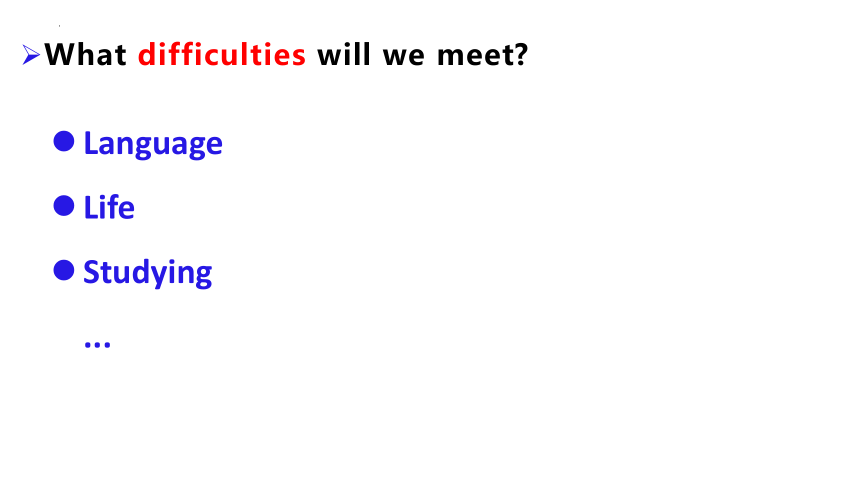
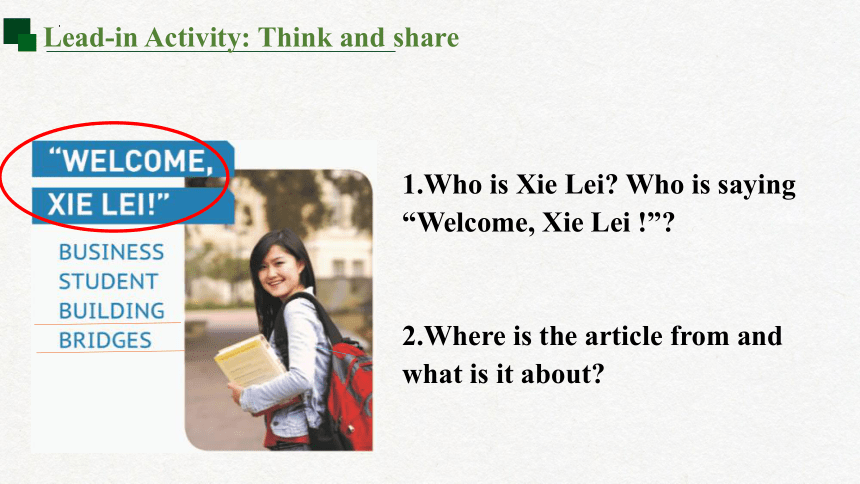
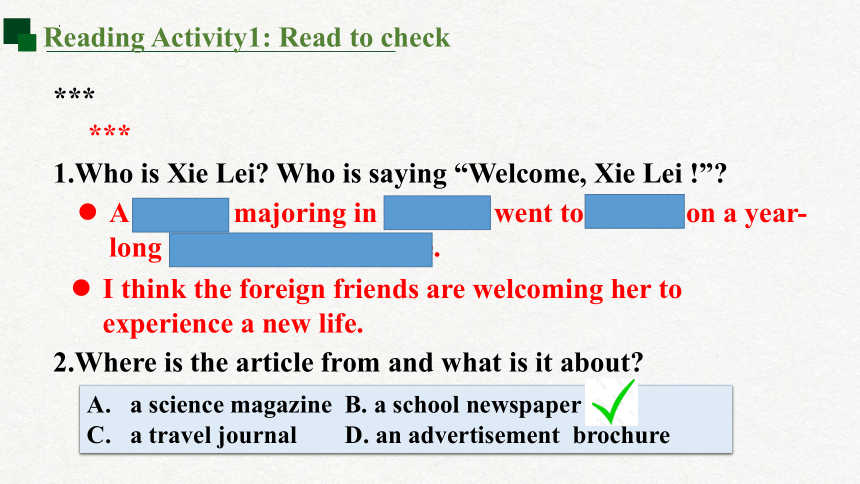
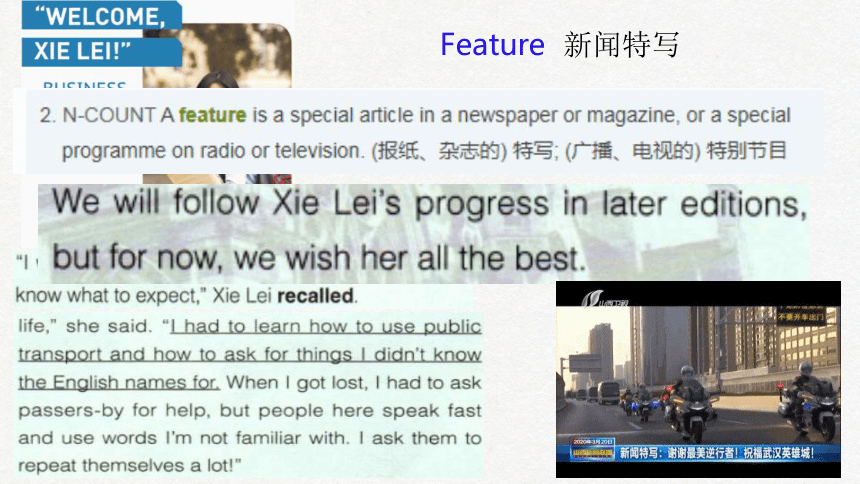
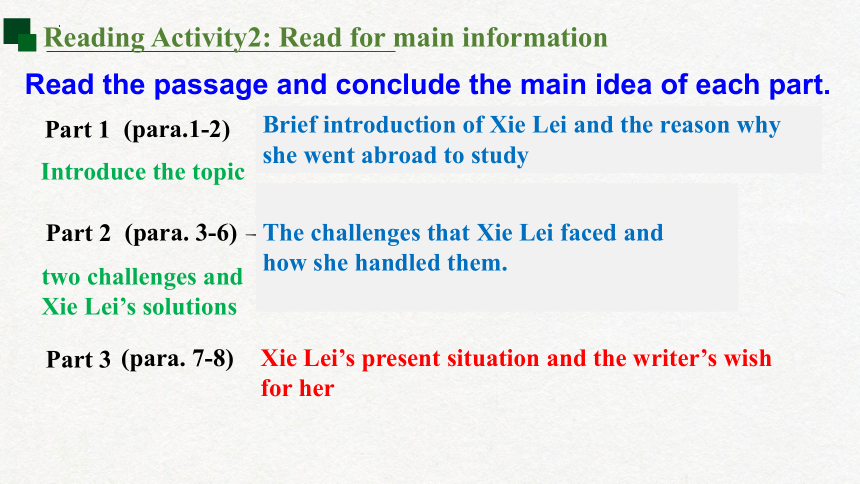
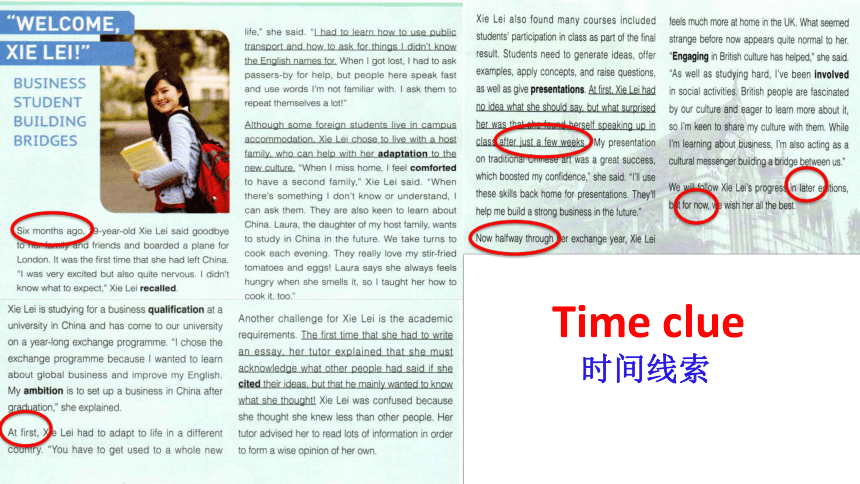
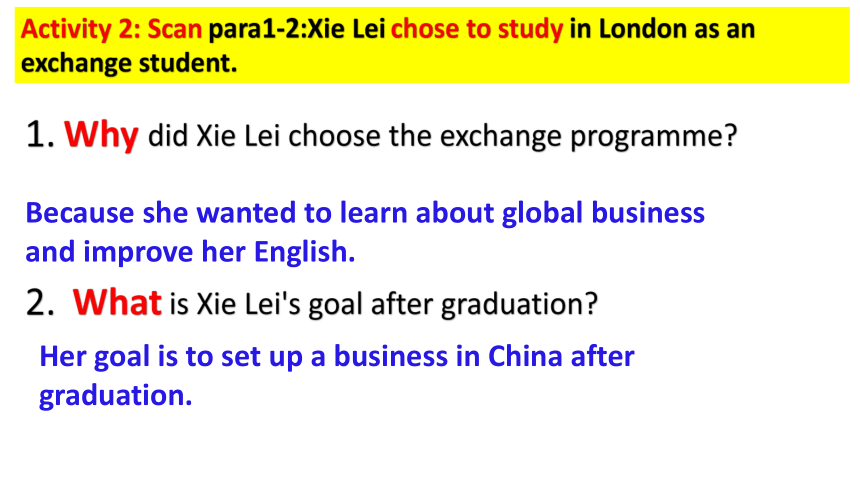
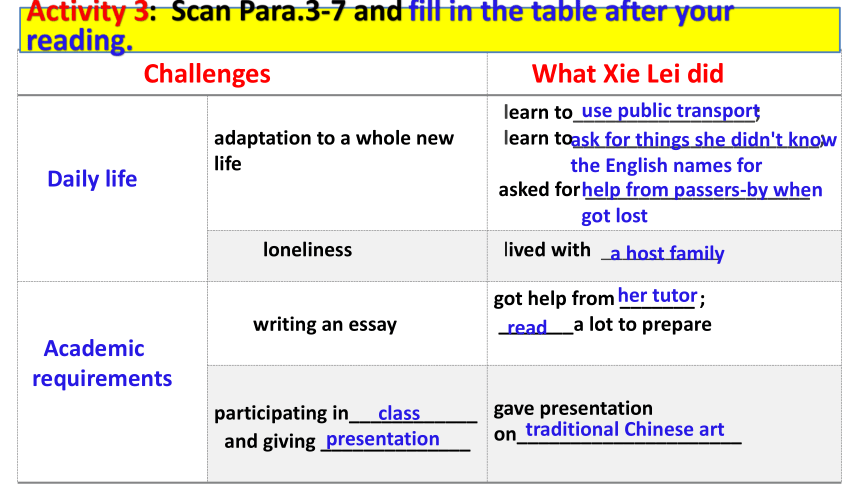
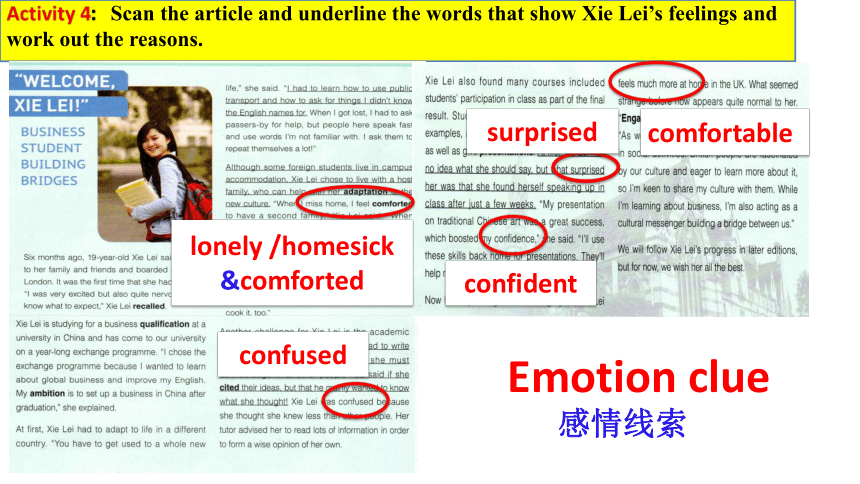
文档简介
(共33张PPT)
教材高中英语人教版选择必修二
Unit 2 Bridging Cultures
Reading and thinking
Is “bridge” a noun or a verb here
What do you think “bridge” means here
To build or form a bridge
What are some ways to “bridge cultures”
learn
foreign cultures
share
Chinese culture
A verb
What do we need to prepare if we stay abroad
Language
Life
Studying
...
What difficulties will we meet
Lead-in Activity: Think and share
1.Who is Xie Lei Who is saying “Welcome, Xie Lei !”
2.Where is the article from and what is it about
Reading Activity1: Read to check
***
1.Who is Xie Lei Who is saying “Welcome, Xie Lei !”
2.Where is the article from and what is it about
***
A student majoring in business went to Britain on a year-long exchange programme.
I think the foreign friends are welcoming her to experience a new life.
A. a science magazine B. a school newspaper
C. a travel journal D. an advertisement brochure
Feature 新闻特写
Read the passage and conclude the main idea of each part.
Part 2
Part 1
Part 3
(para.1-2)
(para. 3-6)
(para. 7-8)
Xie Lei left for London on an exchange programme and her ambition.
Introduce the topic
two challenges and Xie Lei’s solutions
Challenges in daily life (para. 3-4)
Xie Lei’s present situation and the writer’s wish for her
Challenges in the academic requirements
(para. 5-6)
Reading Activity2: Read for main information
Brief introduction of Xie Lei and the reason why she went abroad to study
The challenges that Xie Lei faced and
how she handled them.
How is the text organized
Para1-2:Xie Lei chose to study in London as an exchange syudent.
Para3-4:Xie Lei 's daily life challenge in the UK.
Para5-6:Xie Lei 's studying challenge in the UK.
Para.7:Xie Lei feels much more at home in the UK.
Para.8: Best wishes for Xie Lei.
Time
Time clue
时间线索
Activity 2: Scan para1-2:Xie Lei chose to study in London as an exchange student.
1. Why did Xie Lei choose the exchange programme
Because she wanted to learn about global business and improve her English.
2. What is Xie Lei's goal after graduation
Her goal is to set up a business in China after graduation.
food/restaurants
not polite
adaptation to a whole new life learn to_________________;
learn to_______________________;
asked for _____________________
loneliness lived with ___________
writing an essay got help from _______ ;
_______a lot to prepare
participating in____________ and giving ______________
gave presentation
on_____________________
Challenges
aWhat Xie Lei did
traditional Chinese art
Daily life
Academic
requirements
her tutor
read
class
presentation
a host family
use public transport
ask for things she didn't know
the English names for
help from passers-by when
got lost
Activity 3: Scan Para.3-7 and fill in the table after your reading.
Activity 4: Scan the article and underline the words that show Xie Lei’s feelings and work out the reasons.
lonely /homesick
&comforted
confused
surprised
confident
comfortable
Emotion clue
感情线索
excited . nervous. lonely/forted .confused
surprised. confident. feel at home
Scanning
excited/nervous
comforted
confused
surprised
confident
feel at home
Reason:_____
Reason:_____
Reason:_____
Reason:_____
Reason:_____
Reason:_______
Talk about the information above using the structure
“Xie lei felt… … because… … ”
Xie Lei felt excited and nervous because it was the first time that she had left China.
Xie Lei felt comforted because she had a second family in the UK.
Xie Lei felt surprised because she could speak up in class after just a few weeks.
Xie Lei felt confused because she thought she knew less than other people.
Xie Lei felt confident because her presentation on traditional Chinese art was a great success.
Xie Lei felt at home because what seemed strange before now appears quite normal to her.
Activity 5: Thinking
How has Xie Lei helped to build bridges
between China and the UK
Acting as a cultural messenger
Getting involved in social activities
Sharing Chinese culture with them.
Giving presentation on traditional Chinese art
Teaching people how to cook Chinese food
Business stduent
building bridges
Welcome,
Xie Lei
Discuss and speak
What are the benefits and difficulties of studying abroad
Difficulties Benefits
1.Help us to be independent
2.Be easier to learn a foreign
language
3.Broaden our views
Enrich our knowledge
4.Learn advanced technology
5.Have new experiences
1.Cost a lot of money
2.Be difficult to communicate
with others
3.Be tiring to live in a new country
4. Be homesick and lonely
...
Be a cultural messenger;
Break the barriers between different cultures;
Be more confident !
Face the difficulties in life!
Adapt to the new situation!
Challenge ourselves constantly!
Benefits
Difficulties
Ⅱ.重点短语背诵
1. 向某人告别
2. 登上去伦敦的飞机
3. 为期一年的交流项目
4. 创办一家企业
5. 适应
6. 习惯于
7.向过路人求助
8. 对……熟悉
9. 寄宿家庭
10. 轮流做某事
11. 学术要求
12. 某人自己的
13. 参加;参与
14. 和;也;连同
15. 进行演示
16. 大声点说;明确表态
17. 舒服自在;不拘束
18. (使)从事;参与
19. 参与;卷入;与…有关联
20. 为……着迷
21. 渴望做某事
22. 作为一个信使
23. 祝某人一切顺利
Ⅱ.重点短语背诵
1. say goodbye to sb.
2. board a plane for London
3. a year-long exchange programme
4. set up a business
5. adapt to
6. get used to
7. ask passers-by for help
8. be/get familiar with
9. a host family
10. take turns to do sth.
11. academic requirements
12. of one’s own
13. participate in
14. as well as
15. give presentations
16. speak up
17. feel at home
18. engage in
19. get/be involved in
20. be fascinated by…
21. be eager / keen to do sth
22. act as a messenger
23. wish sb. all the best
1 figure out
2 a year-long exchange programme
3 set up a business
4 be keen to do sth
5 take turns to do sth
6 cite one’s ideas
7 generate ideas
8 speak up
为期一年的交流项目
创办一家企业
热衷于做某事
轮流做某事
引用某人的观点
产生想法
大声点说;明确表态
Language Points: Important phrases (P14 ~ P15)
弄清楚,理解
9 boost one’s confidence
10 build a strong business
11 halfway through
12 engage in
13 be involved in
14 be fascinated by
15 build a bridge between … and
16 wish sb all the best
打造强大的企业
在……中途
(使)从事; (使)参与
参与……;与……有关联
对……着迷;被……所吸引
架起……与……之间的桥梁
祝某人一切顺利
Language Points: Important phrases (P14 ~ P15)
提升某人的自信
Language Points: Important sentences (P14 ~ P15)
1. It was the first time that she had left China. (Para.1)
2. I didn’t know what to expect. (Para.1)
3. I had to learn how to use public transport and how to ask for things I didn’t know the English names for. (Para.3)
4. ... I taught her how to cook it, too. (Para.4)
Language Points: Important sentences (P14 ~ P15)
5. The first time that she had to write an essay, her tutor explained that she must acknowledge what other people had said if she cited their ideas, but that he mainly wanted to know what she thought! (Para.5)
6. At first, Xie Lei had no idea what she should say, but what surprised her was that she found herself speaking up in class after just a few weeks. (Para.6)
7. What seemed strange before now appears quite normal to her. (Para.7)
1. It was the first time that she had left China. (Para.1) 这是她第一次离开中国。
1. It was the first time that Mr Smith had visited China.
2. It is the first that I have come to Henan.
3. It was the last time that I had offered you help unconditionally.
4. It was the first time that little Tom had listened so attentively.
5. It is the third time that we have talked about this issue face to face.
It / This / That is the first / second ... time (that) ... have done ...
It / This / That was the first / second ... time (that) ... had done ...
Language Points: Think and Dig (P14 ~ P15)
Observe and find
Think: What’s the sentence pattern in the sentence above
1. This is the first time that I receive your letter.(改错)
2. It was the first time that you studied abroad.(改错)
3. It is the first time that I __________________ (invite) to attend such an important meeting.
have received
had studied
have been invited
Language Points: Important sentences (P14 ~ P15)
即学即练
4. It was the second time that she ____________ (sing) in public.
5. It is time you ______________ (go) to school.
6. 这是我第一次犯这么低级的错误。
7. 是时候该做些事情改善我们的环境了。
had sung
should go / went
It’s the first time that I have made so silly mistakes.
It is high time we should do / did something to improve our environment.
It is (high / about) time (that)
sb did sth
sb should do sth
Language Points: Important sentences (P14 ~ P15)
即学即练
What do these sentences have in common
2. I didn’t know what to expect. (Para.1) 我不知道会发生什么。
3. I had to learn how to use public transport and how to ask for things I didn’t know the English names for. (Para.3) 我得学会使用公共交通,学会要到我不知道英文名称的东西。
4. ... I taught her how to cook it, too. (Para.4) ……我也教她如何做这道菜。
Language Points: Important sentences (P14 ~ P15)
What do these sentences have in common
2. I didn’t know what to expect. (Para.1)
3. I had to learn how to use public transport and how to ask for things I didn’t know the English names for. (Para.3)
4. ... I taught her how to cook it, too. (Para.4)
句1、2中“疑问词 + to do ”作宾语;
句3中“疑问词 + to do ”作直接宾语。
Language Points: Think and Dig (P14 ~ P15)
一、句型转换
1. He showed me how I can start the online tour.
He showed me ____________ the online tour.
2. Tom forget when he met his friends.
Tom forget ______________ his friends.
3. Sandy is wondering where she asks for help.
Sandy is wondering __________________.
how to start
where to ask for help
Language Points: Important sentences (P14 ~ P15)
when to meet
即学即练
二、Translate the following sentences and point out what kind of the “wh- + to do” act as in the sentence.
1. 在哪里举行会议还没决定。
2. 我在考虑如何实施这个计划。
Where to hold the meeting is a question.
I’m thinking of how to carry out this plan.
主语
宾语
Language Points: Important sentences (P14 ~ P15)
即学即练
3. 她不知道如何去帮助那位老人。
4. 问题是何时开始。
5. 你能告诉我如何更好地学习中文吗?
She didn’t know how to help that old man.
The problems is when to start.
宾语
表语
Could you please tell me how to learn Chinese well
Language Points: Important sentences (P14 ~ P15)
即学即练
直接宾语
5. The first time that she had to write an essay, her tutor explained that she must acknowledge what other people had said if she cited their ideas, but that he mainly wanted to know what she thought! (Para.5) 她第一次写论文时,导师跟她解释说,如果引用别人的观点就一定要注明,不过导师主要是想知道她自己是怎么想的!
Language Points: Think and Dig (P14 ~ P15)
Think: What’s the meaning of “acknowledge”
1. It is generally acknowledged that the automobiles make our life convenient.
2. He acknowledged the greeting with a nod.
3. I should like to acknowledge all the help I have received from my family.
(公开)感谢
向……打招呼;对……作出反应
承认;认为
The first time _____ she had to write an essay, her tutor explained _____ she must acknowledge _____ other people had said ____ she cited their ideas, but _____ he mainly wanted to know _____ she thought! (Para.5)
At first, Xie Lei had no idea ______ she should say, but _____ surprised her was _____ she found herself ________ (speak) up in class after just a few weeks. (Para.6)
____ seemed strange before now appears quite normal __ her. (Para.7)
that
that
what
if
that
what
what
what
that
What
to
speaking
Language Points: Important sentences (P14 ~ P15)
Chinese people suffered from poverty before the reforms in 1978, and the dreams 1. ____ they could live a well-off life were obvious. Luckily, the development of new China made the Chinese believe 2. _____ powerful their country is and 3. ____ they are leading a happy life. Thousands of migrant workers are the greatest contributors to this achievement. To show 4. _______ they can do and 5. _____ they really are, they moved from countries to cities 6. _______ they can fulfill their dreams. They know 7. _______ they should get up and 8. _________ they should go to earn their living. Actually, they have made great contributions to the boom of the cities by means of hard work although they are not sure 9. ____________ they are heroes or not in the society. What’s more, 10. _______ worries them most is that their children can’t receive good education.
that
that
how
what
who
where
when
where
whether
what
Language Points: Important sentences (P14 ~ P15)
即学即练
教材高中英语人教版选择必修二
Unit 2 Bridging Cultures
Reading and thinking
Is “bridge” a noun or a verb here
What do you think “bridge” means here
To build or form a bridge
What are some ways to “bridge cultures”
learn
foreign cultures
share
Chinese culture
A verb
What do we need to prepare if we stay abroad
Language
Life
Studying
...
What difficulties will we meet
Lead-in Activity: Think and share
1.Who is Xie Lei Who is saying “Welcome, Xie Lei !”
2.Where is the article from and what is it about
Reading Activity1: Read to check
***
1.Who is Xie Lei Who is saying “Welcome, Xie Lei !”
2.Where is the article from and what is it about
***
A student majoring in business went to Britain on a year-long exchange programme.
I think the foreign friends are welcoming her to experience a new life.
A. a science magazine B. a school newspaper
C. a travel journal D. an advertisement brochure
Feature 新闻特写
Read the passage and conclude the main idea of each part.
Part 2
Part 1
Part 3
(para.1-2)
(para. 3-6)
(para. 7-8)
Xie Lei left for London on an exchange programme and her ambition.
Introduce the topic
two challenges and Xie Lei’s solutions
Challenges in daily life (para. 3-4)
Xie Lei’s present situation and the writer’s wish for her
Challenges in the academic requirements
(para. 5-6)
Reading Activity2: Read for main information
Brief introduction of Xie Lei and the reason why she went abroad to study
The challenges that Xie Lei faced and
how she handled them.
How is the text organized
Para1-2:Xie Lei chose to study in London as an exchange syudent.
Para3-4:Xie Lei 's daily life challenge in the UK.
Para5-6:Xie Lei 's studying challenge in the UK.
Para.7:Xie Lei feels much more at home in the UK.
Para.8: Best wishes for Xie Lei.
Time
Time clue
时间线索
Activity 2: Scan para1-2:Xie Lei chose to study in London as an exchange student.
1. Why did Xie Lei choose the exchange programme
Because she wanted to learn about global business and improve her English.
2. What is Xie Lei's goal after graduation
Her goal is to set up a business in China after graduation.
food/restaurants
not polite
adaptation to a whole new life learn to_________________;
learn to_______________________;
asked for _____________________
loneliness lived with ___________
writing an essay got help from _______ ;
_______a lot to prepare
participating in____________ and giving ______________
gave presentation
on_____________________
Challenges
aWhat Xie Lei did
traditional Chinese art
Daily life
Academic
requirements
her tutor
read
class
presentation
a host family
use public transport
ask for things she didn't know
the English names for
help from passers-by when
got lost
Activity 3: Scan Para.3-7 and fill in the table after your reading.
Activity 4: Scan the article and underline the words that show Xie Lei’s feelings and work out the reasons.
lonely /homesick
&comforted
confused
surprised
confident
comfortable
Emotion clue
感情线索
excited . nervous. lonely/forted .confused
surprised. confident. feel at home
Scanning
excited/nervous
comforted
confused
surprised
confident
feel at home
Reason:_____
Reason:_____
Reason:_____
Reason:_____
Reason:_____
Reason:_______
Talk about the information above using the structure
“Xie lei felt… … because… … ”
Xie Lei felt excited and nervous because it was the first time that she had left China.
Xie Lei felt comforted because she had a second family in the UK.
Xie Lei felt surprised because she could speak up in class after just a few weeks.
Xie Lei felt confused because she thought she knew less than other people.
Xie Lei felt confident because her presentation on traditional Chinese art was a great success.
Xie Lei felt at home because what seemed strange before now appears quite normal to her.
Activity 5: Thinking
How has Xie Lei helped to build bridges
between China and the UK
Acting as a cultural messenger
Getting involved in social activities
Sharing Chinese culture with them.
Giving presentation on traditional Chinese art
Teaching people how to cook Chinese food
Business stduent
building bridges
Welcome,
Xie Lei
Discuss and speak
What are the benefits and difficulties of studying abroad
Difficulties Benefits
1.Help us to be independent
2.Be easier to learn a foreign
language
3.Broaden our views
Enrich our knowledge
4.Learn advanced technology
5.Have new experiences
1.Cost a lot of money
2.Be difficult to communicate
with others
3.Be tiring to live in a new country
4. Be homesick and lonely
...
Be a cultural messenger;
Break the barriers between different cultures;
Be more confident !
Face the difficulties in life!
Adapt to the new situation!
Challenge ourselves constantly!
Benefits
Difficulties
Ⅱ.重点短语背诵
1. 向某人告别
2. 登上去伦敦的飞机
3. 为期一年的交流项目
4. 创办一家企业
5. 适应
6. 习惯于
7.向过路人求助
8. 对……熟悉
9. 寄宿家庭
10. 轮流做某事
11. 学术要求
12. 某人自己的
13. 参加;参与
14. 和;也;连同
15. 进行演示
16. 大声点说;明确表态
17. 舒服自在;不拘束
18. (使)从事;参与
19. 参与;卷入;与…有关联
20. 为……着迷
21. 渴望做某事
22. 作为一个信使
23. 祝某人一切顺利
Ⅱ.重点短语背诵
1. say goodbye to sb.
2. board a plane for London
3. a year-long exchange programme
4. set up a business
5. adapt to
6. get used to
7. ask passers-by for help
8. be/get familiar with
9. a host family
10. take turns to do sth.
11. academic requirements
12. of one’s own
13. participate in
14. as well as
15. give presentations
16. speak up
17. feel at home
18. engage in
19. get/be involved in
20. be fascinated by…
21. be eager / keen to do sth
22. act as a messenger
23. wish sb. all the best
1 figure out
2 a year-long exchange programme
3 set up a business
4 be keen to do sth
5 take turns to do sth
6 cite one’s ideas
7 generate ideas
8 speak up
为期一年的交流项目
创办一家企业
热衷于做某事
轮流做某事
引用某人的观点
产生想法
大声点说;明确表态
Language Points: Important phrases (P14 ~ P15)
弄清楚,理解
9 boost one’s confidence
10 build a strong business
11 halfway through
12 engage in
13 be involved in
14 be fascinated by
15 build a bridge between … and
16 wish sb all the best
打造强大的企业
在……中途
(使)从事; (使)参与
参与……;与……有关联
对……着迷;被……所吸引
架起……与……之间的桥梁
祝某人一切顺利
Language Points: Important phrases (P14 ~ P15)
提升某人的自信
Language Points: Important sentences (P14 ~ P15)
1. It was the first time that she had left China. (Para.1)
2. I didn’t know what to expect. (Para.1)
3. I had to learn how to use public transport and how to ask for things I didn’t know the English names for. (Para.3)
4. ... I taught her how to cook it, too. (Para.4)
Language Points: Important sentences (P14 ~ P15)
5. The first time that she had to write an essay, her tutor explained that she must acknowledge what other people had said if she cited their ideas, but that he mainly wanted to know what she thought! (Para.5)
6. At first, Xie Lei had no idea what she should say, but what surprised her was that she found herself speaking up in class after just a few weeks. (Para.6)
7. What seemed strange before now appears quite normal to her. (Para.7)
1. It was the first time that she had left China. (Para.1) 这是她第一次离开中国。
1. It was the first time that Mr Smith had visited China.
2. It is the first that I have come to Henan.
3. It was the last time that I had offered you help unconditionally.
4. It was the first time that little Tom had listened so attentively.
5. It is the third time that we have talked about this issue face to face.
It / This / That is the first / second ... time (that) ... have done ...
It / This / That was the first / second ... time (that) ... had done ...
Language Points: Think and Dig (P14 ~ P15)
Observe and find
Think: What’s the sentence pattern in the sentence above
1. This is the first time that I receive your letter.(改错)
2. It was the first time that you studied abroad.(改错)
3. It is the first time that I __________________ (invite) to attend such an important meeting.
have received
had studied
have been invited
Language Points: Important sentences (P14 ~ P15)
即学即练
4. It was the second time that she ____________ (sing) in public.
5. It is time you ______________ (go) to school.
6. 这是我第一次犯这么低级的错误。
7. 是时候该做些事情改善我们的环境了。
had sung
should go / went
It’s the first time that I have made so silly mistakes.
It is high time we should do / did something to improve our environment.
It is (high / about) time (that)
sb did sth
sb should do sth
Language Points: Important sentences (P14 ~ P15)
即学即练
What do these sentences have in common
2. I didn’t know what to expect. (Para.1) 我不知道会发生什么。
3. I had to learn how to use public transport and how to ask for things I didn’t know the English names for. (Para.3) 我得学会使用公共交通,学会要到我不知道英文名称的东西。
4. ... I taught her how to cook it, too. (Para.4) ……我也教她如何做这道菜。
Language Points: Important sentences (P14 ~ P15)
What do these sentences have in common
2. I didn’t know what to expect. (Para.1)
3. I had to learn how to use public transport and how to ask for things I didn’t know the English names for. (Para.3)
4. ... I taught her how to cook it, too. (Para.4)
句1、2中“疑问词 + to do ”作宾语;
句3中“疑问词 + to do ”作直接宾语。
Language Points: Think and Dig (P14 ~ P15)
一、句型转换
1. He showed me how I can start the online tour.
He showed me ____________ the online tour.
2. Tom forget when he met his friends.
Tom forget ______________ his friends.
3. Sandy is wondering where she asks for help.
Sandy is wondering __________________.
how to start
where to ask for help
Language Points: Important sentences (P14 ~ P15)
when to meet
即学即练
二、Translate the following sentences and point out what kind of the “wh- + to do” act as in the sentence.
1. 在哪里举行会议还没决定。
2. 我在考虑如何实施这个计划。
Where to hold the meeting is a question.
I’m thinking of how to carry out this plan.
主语
宾语
Language Points: Important sentences (P14 ~ P15)
即学即练
3. 她不知道如何去帮助那位老人。
4. 问题是何时开始。
5. 你能告诉我如何更好地学习中文吗?
She didn’t know how to help that old man.
The problems is when to start.
宾语
表语
Could you please tell me how to learn Chinese well
Language Points: Important sentences (P14 ~ P15)
即学即练
直接宾语
5. The first time that she had to write an essay, her tutor explained that she must acknowledge what other people had said if she cited their ideas, but that he mainly wanted to know what she thought! (Para.5) 她第一次写论文时,导师跟她解释说,如果引用别人的观点就一定要注明,不过导师主要是想知道她自己是怎么想的!
Language Points: Think and Dig (P14 ~ P15)
Think: What’s the meaning of “acknowledge”
1. It is generally acknowledged that the automobiles make our life convenient.
2. He acknowledged the greeting with a nod.
3. I should like to acknowledge all the help I have received from my family.
(公开)感谢
向……打招呼;对……作出反应
承认;认为
The first time _____ she had to write an essay, her tutor explained _____ she must acknowledge _____ other people had said ____ she cited their ideas, but _____ he mainly wanted to know _____ she thought! (Para.5)
At first, Xie Lei had no idea ______ she should say, but _____ surprised her was _____ she found herself ________ (speak) up in class after just a few weeks. (Para.6)
____ seemed strange before now appears quite normal __ her. (Para.7)
that
that
what
if
that
what
what
what
that
What
to
speaking
Language Points: Important sentences (P14 ~ P15)
Chinese people suffered from poverty before the reforms in 1978, and the dreams 1. ____ they could live a well-off life were obvious. Luckily, the development of new China made the Chinese believe 2. _____ powerful their country is and 3. ____ they are leading a happy life. Thousands of migrant workers are the greatest contributors to this achievement. To show 4. _______ they can do and 5. _____ they really are, they moved from countries to cities 6. _______ they can fulfill their dreams. They know 7. _______ they should get up and 8. _________ they should go to earn their living. Actually, they have made great contributions to the boom of the cities by means of hard work although they are not sure 9. ____________ they are heroes or not in the society. What’s more, 10. _______ worries them most is that their children can’t receive good education.
that
that
how
what
who
where
when
where
whether
what
Language Points: Important sentences (P14 ~ P15)
即学即练
